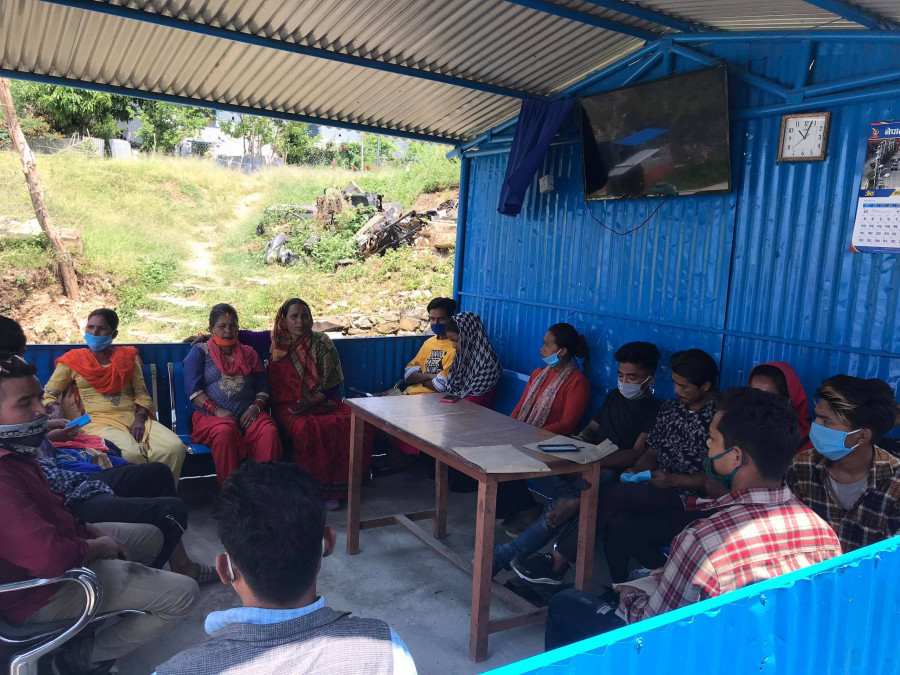National
Rukum (West) murder of six youths was result of caste-based discrimination, parliamentary probe says
Study finds sheer lapses on the part of the local administration, local government and police in handling the incident.
Binod Ghimire
The killings of six youths in Soti village of Chaurjahari Municipality in Rukum (West) were a result of caste-based discrimination prevalent in the society and a crime against humanity, an investigation by a parliamentary committee has concluded.
The report submitted to Speaker Agni Sapkota says the incident was premeditated and conspired by the family of a 17-year-old girl, that was not happy about their daughter having an affair with Nabaraj BK, 21, from Bheri Municipality in Jajarkot district because he belonged to a so-called lower caste.
“It was a pre-planned and well-choreographed mass murder,” Parbati Bishunkhe, a member of the study team, told the Post. “The youths were first taken under control and then killed before they were thrown into the river.”
The House of Representatives, following pressure from the opposition parties, on June 8 formed the nine-member probe team led by Devendra Poudel, a Nepal Communist Party (NCP) lawmaker.
On May 23, dozens of locals from Soti in Chaurjahari Municipality of Rukum (West) district had chased away Nabaraj and 18 of his friends who had accompanied the former to the village to help him elope with his girlfriend, who belonged to the so-called upper caste.
After knowing that Nabaraj was coming to take her daughter, the mother of the girl called villagers including Dambar Bahadur Malla, chairperson of the Ward No. 8 of Chaurjahari Municipality, who attacked the youths with household tools like sickles and axes in addition to wooden sticks and stones that took six lives, leaving 12 others seriously injured.
Besides Nabaraj, the other deceased are Ganesh Budha Magar, Tikaram Nepali, Lokendra Sunar, Govinda Shahi and Sanju BK whose bodies were recovered from the Bheri River.
The incident had drawn international attention, with the United Nations, the Human Rights Watch and the European Union Delegation to Nepal condemning the Dalit killings, saying that caste-based discrminaitons and crimes were still rife in Nepal and and calling for a fair probe into the incident.
The parliamentary study has said it found sheer lapses on the part of the local administration and the local government in the investigation into the incident.
The local police, according to the report, took the injured into control, instead of the attackers, suggesting that the entire investigation process was flawed. Those accused of the murder were arrested only the next day after widespread criticism.
Though the 12 injured reported that their six friends, who were found dead later, were missing, the police showed no promptness in searching for them, the probe has found.
The report prepared after a month of study says the police failed to accurately report the crime scene and the places where the victims’ bodies were found.
The lawmakers found that the police hadn't taken statements from those who recovered bodies from the river.
The report says Sub-inspector Santosh Lamichhane and senior constable Ramesh Basnet, from the Chaurjahari area police post, did not make an earnest and professional effort to prevent the situation.
There were several lapses in the criminal investigation process adopted by the local administration, the team noted, calling for further study. The panel has suggested that the government form a special team to look into the incident.
The parliamentary committee has viewed with suspicion the autopsy report that mentions drowning as the cause of the deaths.
“The fact that the autopsy was carried out by Dr Bhupendra Malla, son of Bhakta Bahadur, the lawyer of the accused, also gives ample room to doubt the authenticity of the autopsy report,” says the report.
Maheshwor Raj Gahatraj, another member of the probe committee, expressed surprise that the investigation process didn’t accord the attention that the incident deserved.
“The incident is a blot on human civilisation and challenges our existing legal and constitutional provisions,” Gahatraj told the Post. As the case is sub-judice in the district court, he said, they did not look into legal aspects during their investigation.
The police had filed a charge sheet against 34 people in connection with the case and had arrested 29 of them. The district court has released five after recording their statements while two, including Nabaraj’s girlfriend, have been sent to juvenile correction centre.
The lawmakers involved in the investigation say the girl was drawn towards Nabaraj after she saw him perform during an inter-school sports competition and in due course they got closer and started to have an affair.
But when it came to a situation that the boy wanted to marry the girl, it became an issue of social pride for the family, which resulted in the heinous crime, said Bishunkhe.
The Poudel-led team has also drawn the government’s attention to the need to give full shape to the Dalit Commission.
Nearly five years since the promulgation of the constitution, the commission, along with other inclusion commissions, does not even have a proper office.
The Poudel-led team has also said that the traditional criminal investigation process, which is still in practice, needs improvement.
While receiving the report, Sapkota said he will take initiatives for an immediate implementation of the report. As Parliament has been prorogued, the report will be sent to the government for implementation.




 18.12°C Kathmandu
18.12°C Kathmandu














